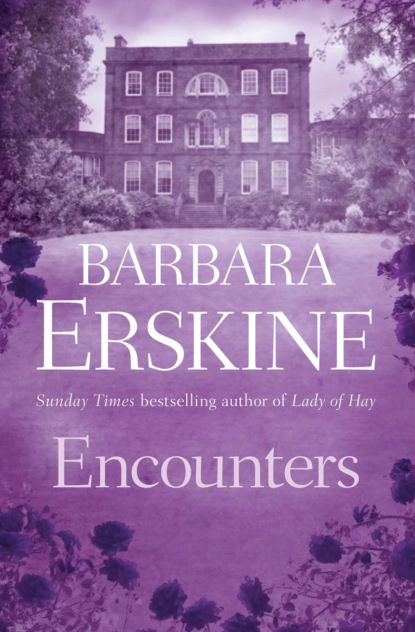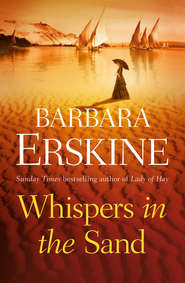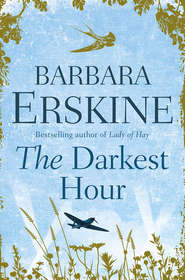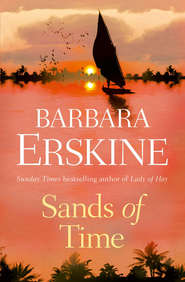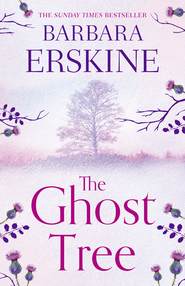По всем вопросам обращайтесь на: info@litportal.ru
(©) 2003-2024.
✖
Encounters
Автор
Год написания книги
2018
Настройки чтения
Размер шрифта
Высота строк
Поля
Had her make up been so good then? She stammered a greeting in return and showed him at his request into the studio.
Reaching into his pocket he produced an envelope. ‘I’m glad to say I’ve managed to sell one of your paintings, Miss Millrow.’
‘Already?’ her voice came out in a squeak.
‘Already.’ He grinned at her amicably. ‘It was lying on my table after you, that is your agent,’ he corrected himself quickly, ‘had left it with me and I had a buyer almost at once. It seems my initial judgement may have been a little harsh.’
‘I’ll say it was,’ she muttered under her breath, and then out loud she asked. ‘How much did you get?’ She took the envelope with shaking fingers.
‘There’s thirty-five pounds there. I’ve already taken my commission.’ He grinned again. ‘I imagined that under the circumstances you would rather pay your agent her commission yourself.’
Kate felt herself blushing crimson. ‘You must think I’m an awful fool.’
‘Not at all. You’d be surprised how many people come in with pictures they say a “friend” has painted. Mind you,’ he looked her up and down pointedly. ‘Not many of them go to the lengths you did for a disguise.’
She blushed again. ‘I’m afraid I’m rather a mess at the moment. I was cooking.’
He nodded. ‘Cabbage. I had guessed.’
She smiled ruefully. ‘I’m afraid I live on it.’
‘Why don’t you go and continue while I poke around here for a bit and investigate your,’ he paused and winked, ‘your potential.’
She fled.
It took only a few minutes to throw the vegetables into a pan and scrub her hands and then she ran upstairs to comb her hair and change her skirt. When she came down he had piled several canvases on the table.
‘I’ll take these next,’ he said without preamble. ‘Sale or return of course, and I’ll buy this one myself …’
Again it was flowers, she noticed amazed.
‘… if it’s not exorbitantly priced. Now,’ he looked at her again. ‘Could that concoction you were making wait do you think? If you were to transform yourself, not into that hard hitting woman Miss Rowmill, but perhaps into a slightly tidier version of yourself I could take you out to dinner to celebrate your sales.’
She looked at him amazed. She had got the firm impression he despised her and her kind, and she certainly disliked him. So why ask her out? And anyway he was insufferably rude. A slightly tidier version of herself indeed. She curbed the desire to stick out her tongue at him. Instead she lowered her eyes meekly to the floor. ‘That would be nice,’ she said. ‘Much better than cabbage.’
She had a Laura Ashley dress upstairs and pretty Venetian sandals. Her hair beneath its gay scarf was at least clean. Oh yes, Mr Chambers. She could be tidier when she tried.
She debated over lipstick for several minutes in her bedroom and then decided against it. Miss Rowmill might wear lipstick, but she did not. She clipped on the silver bangle her parents had given her for her eighteenth birthday and gazed at herself in the stained old mirror. The image, she had to admit, was rather attractive.
Mr Chambers evidently thought so too, for he stopped being rude, told her his name was Derek and ushered her out to his car with exaggerated care. He even helped her with the seat belt.
‘I have a ten per cent interest in you, my dear Miss Millrow,’ was his only comment when she protested.
They drove back into town and he took her to the most delightful French restaurant she had ever been to. He almost talked her into having something called Dolmas Maigre, but the suppressed glee in his expression led her to guess it might have something to do with cabbage and to his chagrin she checked with the waiter before she ordered. Once that hurdle was over the evening continued fairly well. She found herself telling him about art school and John’s offer of the cottage and her parents’ anger when she had ‘dropped out’, as they of course put it. To her surprise he threw his head back and laughed.
‘Dropped out, a prim little miss like you? Nonsense. Besides, they ought to be proud of you. You have a great deal of talent. And not only for painting. If you ever get bored with that, you could go on the stage.’
She looked at him to see if he was taking the micky, but his expression was all innocence. He quickly topped up her wine glass. ‘Yes, Miss Millrow, you have a great deal of talent.’
To her annoyance she found herself blushing although she was quite sure he was teasing. His fingers had strayed towards her own on the blue table-cloth and as they so very casually, almost by accident, made contact, she snatched her hand away. She was not going to be that easy to placate. She took a gulp of wine.
When they parted that evening, however, it was on the understanding that they would meet again the following Saturday and that, if she could face the bus ride into town, she would go to see him at the gallery even before then.
‘Now,’ he said, looking up at her mischievously from the driving seat as he started up the engine. ‘About what you wear when you come. Shoes, yes. Lipstick, no. Jeans, yes if decent. Right?’
She grinned. ‘And next weekend?’
‘Next weekend, if you’re cooking for me, a large plastic apron, which I will personally provide.’
‘Nothing else?’ Her eyes widened.
He laughed. ‘That, my sweet Kate, is up to you. But I’ll live in hope.’
She stood waving as he drove off down the lane and then slowly she made her way back into the shadowy cottage where he had lit the oil lamp for her and left it, flickering slightly on the table. She was unbelievably happy.
‘Damn cheek,’ she muttered to herself. ‘Who does he think he is?’
Metamorphosis (#uf3fe027c-6611-5753-baa3-d7c832dcc5de)
She couldn’t remember how she came to be on the train. She knew the station had been huge and echoing and she had walked through it as through the rib cage of a dinosaur, to find the tiny womb of the compartment where she was to sleep. It was safe there; warm and dark and alone. When the man knocked and called out the different sittings of meals she hid her head beneath the blanket and he went away and then she still lay listening, as the wheels beat the rhythm of a foetal heart.
She who had been afraid to walk the streets of London, afraid of unknown lurking terrors, afraid of men and dogs and children and women like herself, somehow she had managed to change trains and between them she had bought herself a tea from an anonymous uncaring man who slopped the liquid across ranks of cups and watched it gurgle, stewed and wasteful through a grating. She dared not ask for a spoon, but she was well pleased with herself for the tea. It was hot and good to drink. The station had been alive with people and pigeons. Brisk sunshine streamed through dirt-encrusted glass. She realized that she was already no longer so afraid as she climbed aboard the second train and waited for it to travel north.
There was a taxi to find at the other end. She stood on the esplanade looking across at the fishing boats and sniffed the glorious sea. It gave her strength. She felt in her pocket for the key; a large cold key; the key to sanity.
Her driver had the soft-spoken gentle ways of the west. He made her welcome and gentled her as he would a doe come down from the hills in the snow. She had the great dark eyes of a doe, he thought. And the unnamed terror. Was it life she feared, or herself? She sat beside him, her fingers clutching the purse she needed to pay him and he knew she dreaded the moment she must pay, for the human contact it involved. He told her the names of the mountains and the lochs and he soothed her with softly-aspirated vowels.
Skies as wide as for ever opened now above her head and she felt light and free again. There were no more buildings. The taxi was bumping and swerving away from yesterday and carrying her inexorably with it. There would be no more hospitals now, no more drugs, no more fears. But memories; there were still memories.
‘What you need now is a holiday, Miss Tansley,’ the psychiatrist had said, briskly misunderstanding. ‘Is there somewhere you could go, by the sea perhaps; someone you could go with?’ and he had looked at his watch. She wanted to cling; to stay; to come again. But he had finished with her. Her case was closed.
The sun reflected on a silver loch dazzling her eyes with its beauty. ‘There is Appin,’ she had said. ‘I can go to the cottage in Appin.’
‘Fine, fine. Do that.’ His mind had withdrawn from hers. He was already thinking of the next patient.
So she had done it. Slowly and methodically she had arranged it all. The cottage would be hers for a month with the seas and the lochs and the islands beyond the west where men go when they die and stay for ever young. All of it was hers.
But it had all been almost too difficult. The world was still a menacing place; a place of greys and blacks and angry red. She had had to fight to keep the panic away. And she had thought silently in her bed, her eyes fixed on the cracked crazed ceiling which was no ceiling in the dark, but an infinite chasm, of the silver and the blues of the western shore where she had spent her long happy childhood holidays and she grasped towards the healing and the reality which the salt air must bring to her soul.
‘Will you be all right, miss?’ The taxi driver’s face, beaten red by the wind and sun was crumpled with concern. He waved away the shaking hand which held a painfully calculated ten per cent and picked up her case to carry it to the door.
She proffered the key and he took it and opened it for her. The great stone hearth was unchanged. The rocking chair was still there. But the people were all gone.
She stretched her lips to smile at him and stood when he had gone, a shiver holding her in the centre of the floor. She could hear echoes. Echoes of her voice as a girl, pretty, carefree, happy as only the ignorant can be and of her brother, more raucous his and loud, but with the same intonation. And the Fairburn cousins, their two shouts indistinguishable twin from twin, and the gentle remonstrations of her mother; and her father putting his hands to his ears as he sorted out the lines for the sea trout. And the barks of Romany and Diddakoi, the two Battersea waifs, so long ago buried in the garden beneath the apple tree. She shivered again and felt the tears pricking her eyelids.
‘Cry, my child. The day you can cry you will be on the way to being cured,’ the psychiatrist’s level voice echoed in her head. The tears were there all right, but still they would not fell. As they had not fallen since the car had spun out of reality and into nightmare taking mother, father, brother, lover all from her in one clap of thunder.
Slowly she walked into the bedroom which had once been hers. It was the smallest and it overlooked the island, shimmering in the evening waters. She opened the window and looked out, breathing sweet thyme and lavender from the flower below. The stone was cold and hard to her elbows but she leaned there a long time watching for the luminous highland night which almost never came. Then at last she lay down on the bed, her coat still on, her shoes kicked wearily aside and she slept, not hearing the owls, the jumping fish and the hill noises of the night.





